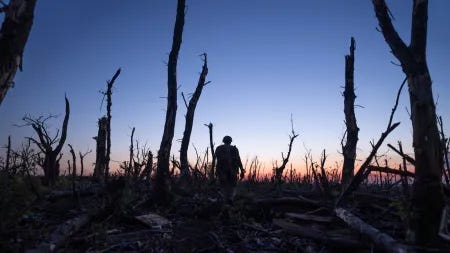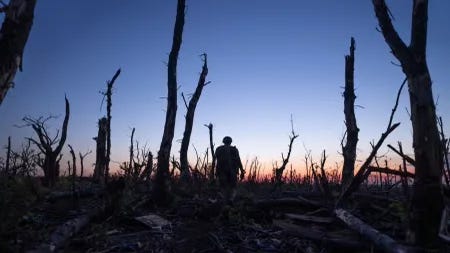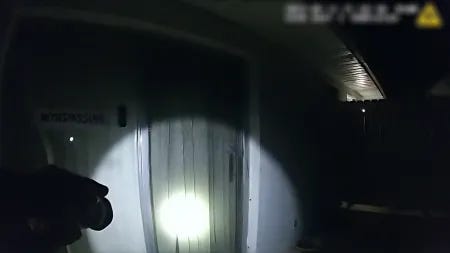Let's Not Forget Sundance Took Place During Trump's First Week in Office
This year's festival wasn't a dud; the country is.
There was definitely a feeling of disconnection and ennui at Sundance 2025, but it didn’t have anything to do with the the state of the independent film industry. While journalists and critics were whining about how the festival was losing its mojo, the real issue at hand was the collapse of the United States of America. But many of us were too busy complaining about the missteps of films such as “Magic Farm” and “Bubble & Squeak” to take a look around us. Certainly, it was a relief to be in the festival bubble for the first week of the Trump Presidency, but I quickly found myself looking for films that would burst that bubble and help me face the harsh reality that we’re now living in a country that has embraced baseless conspiracy theories and “anti-equity” as its rallying cry.
On my first day of the festival, I had a profound experience watching Mstislav Chernov’s visceral, haunting, and gut-wrenching nonfiction stunner "2000 Meters to Andriivka,” a film that I found even more powerful than his Oscar winner “20 Days in Mariupol.” Set in Eastern Ukraine, in a hellscape that used to be a forest, the film follows Ukrainian platoons as they fight for every inch of their land, trying to creep ever closer—2000 meters, 1000 meters, 500 meters—to retake the devastated city of Andriivka. Chernov skillfully balances the heart-stopping you-are-there combat footage recorded from their helmet-cams with more intimate moments with the soldiers, showing their vulnerability and humanity. The stakes couldn’t be higher, for the soldiers or for Chernov himself, and the film is one of the most compelling documentaries I’ve seen all year.
The footage reminded me of the wave of combat films that I wrote about 15 years ago about the war in Afghanistan (“Giving Audiences the War They Want”, R.I.P Tim Hetherington) as well as some of the great war films of all time—from “All Quiet on the Western Front” to “Paths of Glory” to “Apocalypse Now.” And yet, what we’re seeing is still happening every day in Ukraine. (On the day I watched the film, a Russian missile strike killed one person, wounded 31 people, and left tens of thousands without power in Zaporizhzhia.) The film ends with a stirring reality-check from the filmmaker: The realization that the longer the war drags on, the less people will care about it. And the less they will hear about it, from our current Administration and from our media. Produced by Frontline and the Associated Press, "2000 Meters to Andriivka” is slated for public broadcast next year, but the way things are going, there may not be a public television next year (as I wrote in Indiewire recently).
In terms of other timely stories, two of the festival’s better fiction films (“Train Dreams” and “Rebuilding”) eerily featured the consequences of deadly fires on families and communities. Screened while the Los Angeles fires were still burning and the current Administration was scrubbing the words "climate change” from all government websites, it was difficult not to see how these films might be viewed as messages of environmental collapse, even though both films decidedly avoided politics to focus on the human cost of such catastrophes.
There were also documentaries that forced audiences to consider Trump 2.0’s attempt to erase trans lives (“Heightened Scrutiny,” “Enigma,” “GEN_”), and stories rife with resonant queer characters and stories. James Sweeney’s “Twinless” was a fiction highlight, while “Come See Me in the Good Light” was a documentary emotional roller-coaster that will have audiences in tears and profoundly rooting for its female queer lovers.
But the one documentary that inadvertently captured our current American moment perhaps better than any other was Geeta Gandbhir’s absolutely riveting “A Perfect Neighbor.” (I missed “The Alabama Solution,” but I suspect that one also says a lot about the country’s current moral crisis.)
While “A Perfect Neighbor” has been described in connection to Florida’s egregious “Stand Your Ground” laws, the film has much more to do with larger issues of race and class in the U.S. right now. Audiences might be surprised to learn such a hard-hitting film about law and disorder in America, and one largely stitched together out of police body-cam videos, actually depicts local police as a relatively reasonable, though ineffectual force.
No, the major revelation here is the utter failure of our society to care about each other, and to reckon with our firmly entrenched—and now championed—racism. And where our neighbors, yes, the very people who live right next to us and see us going to work everyday and watch our children playing in the yard outside, have been turned against us. In some ways, every one in the film is a victim of our society. Like David Osit’s complex and disquieting“Predators,” even the perpetrators of the crime are also the victims. They have been fed a series of lies, lived in a system without proper healthcare, and raised on white supremacy to the point that that they are completely out of touch with humanity. In Trump’s America, the perfect neighbor has a gun and be careful what you say or do, because they’ve been empowered to use it.






I'm not entirely sure if our scumbag-in-chief can be blamed for how truly awful Bubble And Squeak was. But right there with you on "The Perfect Neighbor", pretty much casual Americans in a nutshell there. That woman was terrifying in her mundanity and recognizability.
Fromtheyardtothearthouse.substack.com